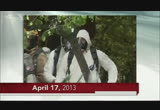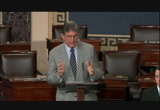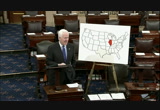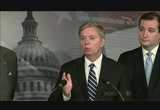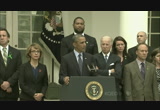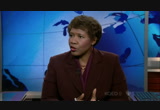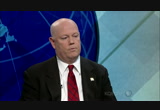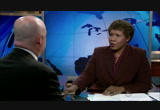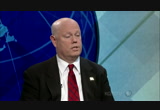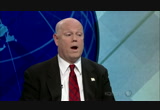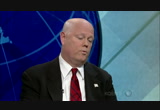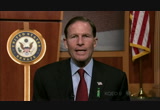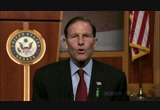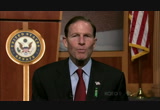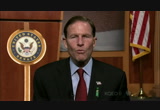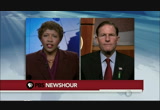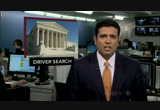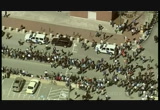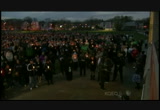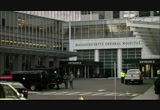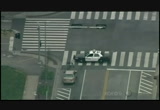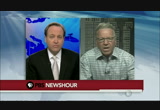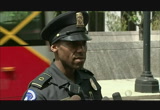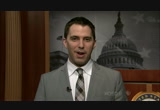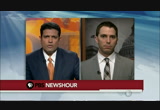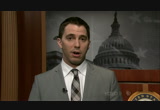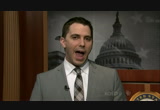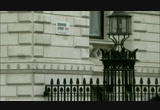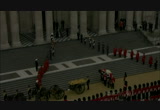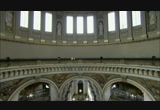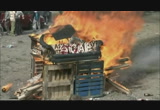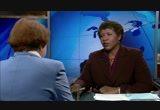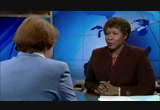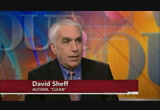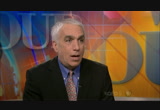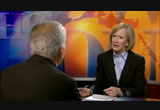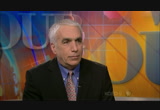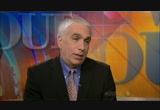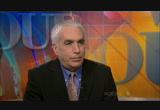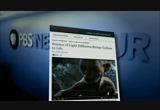tv PBS News Hour PBS April 17, 2013 6:00pm-7:01pm PDT
6:00 pm
captioning sponsored by macneil/lehrer productions >> ifill: the senate rejected a bipartisan proposal to impose background checks on some gun buyers, dealing a blow to the white house and to gun control advocates. good evening, i'm gwen ifill. >> brown: and i'm jeffrey brown. on the "newshour" tonight: we get reaction to today's vote and what it means for the future of gun legislation. >> ifill: then, conflicting reports caused confusion over the status of the investigation into the boston bombings. we have the latest on what's known and what's not. >> brown: letters sent to the president and members of congress were believed to contain the poison, ricin. todd zwillich of wnyc reports on the suspicious packages. >> ifill: and britain's first female prime minister is buried. in london, thousands turn out to wish margaret thatcher a fond farewell, others to bid her good
6:01 pm
riddance. >> brown: marcia coyle has analysis of today's unanimous ruling from the supreme court that blocks human rights cases abroad from being tried in the u.s. >> ifill: and judy woodruff talks to the author of the new book "clean," about his deep dive into the myths and realities of drug addiction. >> it's seen as a choice: "if you're having problems in your life because you're using drugs or you're drinking, stop." well, people who are addicted would stop, if they could. >> ifill: that's all ahead on tonight's "newshour." >> major funding for the pbs newshour has been provided by: >> and with the ongoing support of these institutions and foundations. and...
6:02 pm
>> this program was made possible by the corporation for public broadcasting. and by contributions to your pbs station from viewers like you. thank you. >> brown: the campaign for new curbs on guns ran into senate opposition today that it could not overcome. 41 republicans joined with five democrats to kill the proposal that was thought to have the best chance of passing. "newshour" congressional correspondent kwame holman begins our coverage. >> this bill protects honest, gun-loving, law-abiding citizens more than any piece of legislation we've had in the last two to three decades. and i think that people who've read the bill know that. >> reporter: west virginia democrat joe manchin made a final, impassioned plea with his senate colleagues to support expanded background checks to would-be gun buyers at gun shows and online. >> i understand that some of our colleagues believe that supporting this piece of legislation is risky politics.
6:03 pm
i think there's a time in our life that's a defining time in public service. a time when you have the ability to stand when you know the facts are on your side and walk into the lion's den, and look that lion in the eye, and tell that lion, "listen, not today, not today." >> reporter: the proposal on background checks was put forward by manchin and pennsylvania republican pat toomey. it headlined a list of nine amendments to a broader gun control measure, being voted on today. they included provisions offered by democrats to ban assault weapons and high-capacity ammunition magazines. and a republican-sponsored measure that says states must honor concealed firearm permits from other states. that amendment was authored by texas senator john cornyn. >> a concealed handgun license is like a background check on steroids. it's far more intrusive into the privacy and the background of a person who applies for a handgun
6:04 pm
license. this standard ought to be one that those who support a robust background check regime could also support. >> reporter: california democrat dianne feinstein, meanwhile, spoke in favor of the assault weapons ban she introduced. >> i do not believe that our values are stronger because we allow individuals to own weapons designed for the sole purpose of killing as many people as possible. >> reporter: but south carolina republican lindsey graham said the measures being touted by president obama and most democrats would do little to reduce gun violence. >> the president wanted three things done. he wanted to ban assault weapons. he wanted to limit magazine sizes. and he wanted to impose a universal background check. well all three of those concepts are going to be on the floor of the united states senate for a vote, and they're all going to lose. why? because they're not the solution to the problem we all face. >> on this vote the yeas are 54,
6:05 pm
the nays are 46. >> reporter: in the end, as vice president biden presided, the background check amendment failed to clear the 60-vote threshold needed to pass. the concealed firearm measure and the ban on assault weapons. also failed. but late in the day, senate democrats-- joined by family members of victims of gun violence-- pledged to keep up the fight. >> i want everyone to understand this is just the beginning not the end. the forces so obsessed with defeating any commonsense reforms whatsoever, they lost site of big picture. >> reporter: and president obama spoke minutes later from the white house rose garden. >> no single piece of legislation can stop ever act of violence and evil. we learned that tragically just two days ago. but if action by congress could have saved one person, one
6:06 pm
child, a few hundred, a few thousand, if it could have prevented those people from losing their lives to gun violence in the future, while preserving our second amendment rights, we had an obligation to try. and this legislation met that test. and too many senators failed theirs. >> reporter: this was just the first day of voting. but after the string of defeats for gun control advocates, the fate of the overall bill was unclear. >> ifill: for more on what led up to the senate action, we turn to two voices. lawrence keane is senior vice president and general counsel for the national shooting sports foundation, the trade association for the firearms industry. thank you for joining us. we had thought-- we had heard from this bipartisan agreement that joe manchin and pat toomey, the democratic and the republican came up with on background checks, that this was finally the grand bargain. but it wasn't. what happened to that? >> well, i think that there was
6:07 pm
never really enough votes, as we saw today, to pass their proposal, and, you know, we believe senator manchin's intentions were honest and he's not trying to infringe upon second amendment rights or asking like that. the problem we had from the industry's point of view with the legislation, the bill prioritized background checks for gun shows over those taking place at storefront retailers, and that just wouldn't work for our members. we represent thousands and thousands of firearm retailers, and so we thought that was a problem. and it actually was worse than that, because the way the language was drafted, it would require all background checks at gun shows had to be completed before you could do a background check from a storefront f.f.l. dealer. so that would shut down background checks on weekends for storefront dealers. that is unacceptable for our dealers. >> ifill: you heard senator
6:08 pm
graham, that the president pushed for three things, background checks, assault weapon-- >> banning-- >> ifill: magazines. >> and universal background checks, correct. >> ifill: you won on all three of those grounds, and why? is there any sort of gun control effort you would support? >> well, i think it's important that-- we oppose bans on modern sporting rifles, the most popular rifles being sold in the united states today. roughly half the people that buy them are current or former members of the military or law enforcement. they buy them for legitimate purposes-- primarily for target shooting and increasingly to go hunting. members of the united states senate and congress own those firearms. paul ryan, for example, owns one of those and goes hunting with them. >> ifill: that one was a forgone concliewrkz as were the magazine clips, but the background checks not so much. >> our concern with the universal background checks is we think the problem we see is
6:09 pm
you have to fix the nix system. the first thing you need to do is fix the nix system which is why our industry is funding an initiate toif work at the grass-roots level to work with the states falling down on the jobs and not getting the background checks-- getting the information into the background check system. the system is only as good as the information that's in it, and background checks that are incompleted and accurate don't help anybody. having more of those background checks that are incomplete also doesn't help anybody. >> ifill: as far as you're concerned even though the president-- or harry reid said, this is round one-- both of them said it-- you think for the federal level this argument is over. >> no, i don't think so at all. i met with senator reid today and senator manchin, and we believe the discussion is not over, and we don't believe the discussion should be over. the dialogue should continue. look, we all share the goal of wanting to make our communities safer but reasonable mind can and do disagree about how best
6:10 pm
to achieve that. we don't agree with banning firearms or banning magazines or having so-called universal background checks, which are opposed by 86% of the firearms retailers in the united states. and the president's proposals are also not supported by the men and women in law enforcement. over 85% of the men and women in law enforcement do not support the president's proposal. >> ifill: but the president says 90% of americans support it. >> i think you-- i don't know that they understand exactly what is meant by universal background checks. from our point of view, from the industry's point of view, the problem is you have to fix the nix system first. we like some of the provisions, and we told senator march and i know senator toomey, we like some of the provisions that were in his amendment. similar provisions were in senator grassley's proposal. we supported senator grassily's proposal. we think there can be common ground on things like fix, nix, and getting records into the sand providing resources for mental health that we think that
6:11 pm
the common denominator in a number of these recent high-profile shootings is the mental health of the shooter. and they're not getting the treatment they needed. they're not in the system. or if they're the system, the records aren't showing up in the background checks. >> ifill: one of the democrats who voted against the baek checks, senator max baucus, was asked why did you vote again is, and he said montana, his home state air, very red state, and the president said this was all about politics. how much of this was about the content of this slairkz how much was about pure politics? you can't do it and go home and get re-elected. >> look it's washington. politics is always part of the discussion. but for the industry it's about the policy. we think the focus needs to be on fixing nix, it's part of our initiative, and we think the other part of it is we need to address the mental health problems in our country. that's one of the issues there's common ground of, and we need to do enforcement of the law. part of the problem we see the
6:12 pm
background checks that occur now under current law, the people that fail it aren't being prosecuted. if you expand to so-called universal background checks, if you don't prosecute the people that fail the background checks what's the point glaen. thank you very much. >> now we're joined by senator richard blumenthal a democrat from connecticut. he joins frus the senate. there were members from newtown in the gallery today as this vote happened. what was the reaction? >> today was heartbreaking for me, really sad and shocking, but the hardest part was to explain to the families how 90% of the americans could be in favor of background checks, and the senate failed to reach the necessary 60 votes. and their reaction was absolutely inspiring as one of them said to me when i said, we're coming back." she said to me, "it's not even
6:13 pm
close. we're coming back. ven close." >> ifill: what does that mean "coming back." after you failed to get the 60 votes necessary, on not only this but on a number of other piece of gun control legislation today, what does coming back look like? >> coming back looks like persuading colleagues that the american people are not just in favor of background checks, illegal trafficking bans, and stronger school safety measures, along with a ban on assault weapons and high-capacity magazines, but the american people are going to hold the senate accountable and answerable between now and election day, and on election day. so i think that the resoluteness and resilience of the families has to be shown by elected leaders here. and if they show an ounce of courage that these families have shown, they will vote for these measures the next time around. and the leader, majority leader
6:14 pm
reid, has indicated there's no question that we'll have more votes. >> ifill: senator, you pulled out all the stops this time. we saw the newtown families making the rounds face to face, meeting with senators. the president came out numerous time and showed his passion, went to connecticut, met with the families, brought them here on air force one, and you were not able to persuade enough of your colleagues this time around. what will be different? >> gwen four months ago this issue was thought to be politically untouchable, and just about a week ago the goal of 60 votes to continue the debate was thought to be unreachable. there has been a seismic change in the political landscape, and it is still changing. so i think there is the real possibility that people are going to be listening to constituents back home who will learn for the first thyme a majority of votes in the senate isn't good enough to get action. and that is a fundamental indictment of our democracy to
6:15 pm
say that 55 or 54 votes in the united states senate to save lives and make our neighborhoods safer and keep faith with the families of newtown, as well as the 3400 other victims of gun violence since then, is not enough to seek and get action. and i will just say one other thing-- you know, what you've just heard about improving the nix system is absolutely right. there is common ground here. we do need to improve the amount and accuracy of information going into the national instant criminal background check system. it's the life blood of the background checks that are used to keep guns out of the hands of crus people. but we can do that and improve the background checks so as to cover all firearm purchases. we can have more prosecution. i'm a former prosecutor. i was the united states attorney for four and a half years in connecticut and the attorney general of our state for 20 years. so i believe in more prosecutions. >> ifill: senator, i guess i understand what you're saying.
6:16 pm
but i've heard you say it before and others say it before. i'm trying to figure out how the argument or the dispute here is any different than it has been in past years when you brought gun legislation to the fore. it hasn't-- it's been rolled back, and then you've gone back to your corners and nothing else has happened. the president seemed frustrated today but i'm not quite certain how you change minds. >> this time we're not going back to our corners. if that's happened in the past. certainly what you heard today from two of the highest leaders in our country are a resoluteness and determination that perhaps hasn't been present before, and tragically, gwen, we will have more killings. we will have more mass shootings. they will result from assault weapons. and from high-capacity magazines. but most important, they will result from criminals having their hands on these weapons of war, not only the assault
6:17 pm
weapons but also handguns and other weapons that have to be kept out of their hands. >> ifill: let me judge ask you what you just asked key from the shooters association. how much of this is pure politics. >> there were profiles of courage today on the floor of the united states senate. there were also some folks who maybe were a little bit more fearful and apprehensive than they need to be because the specialists here having mced to mobilize a small, investment, vocal part population, some concentrated in some states. but at the end of the day ttakes a majority to win an election, and i think they're going to hear from the majority. >> ifill: senator richard blumenthal of connecticut, thank you for joining us. >> thank you. >> brown: still to come on the "newshour": the latest from boston on the investigation into the bombings; suspicious packages are sent to washington; praise and protest for britain's
6:18 pm
"iron lady"; a unanimous decision at the supreme court and a deeper look at addiction. but first, the other news of the day. here's hari sreenivasan. >> sreenivasan: the investigation into the killings of a north texas district attorney, his wife and an assistant prosecutor took a new turn today. authorities said kim williams-- the wife of a former justice of the peace-- has been charged with capital murder. investigators had been focusing on her husband-- eric williams. he was arrested saturday for making threats. the murdered officials prosecuted williams for computer theft last year. he was convicted and lost his elected position. the u.s. supreme court has sent down new guidelines for handling suspected drunken drivers. a decision today said in most such cases, police must try to get a search warrant before ordering blood tests. that's already the case in about half the states. the state of missouri and the
6:19 pm
obama administration wanted a blanket rule allowing the blood tests without a warrant. thousands of people in southwestern pakistan were homeless today-- 24 hours after a powerful earthquake rocked neighboring iran. at least 700 homes in the mashkel area of baluchistan province were reduced to rubble. some 35 pakistanis were killed in the quake, and another 150 were injured. the pakistani army said it deployed several hundred soldiers to the quake zone to bring much-needed humanitarian relief. in the middle east, islamist militants fired at least two rockets from egypt's sinai peninsula into southern israel, adding to growing security concerns there. they targeted the resort town of eilat. but police officials said there were no casualties. meanwhile, palestinians in the west bank and gaza marked prisoner day, urging israel to release palestinian detainees. they waved flags and carried pictures of some of the 4,500 palestinians in custody. new zealand became the 13th country in the world today -- and the first in the asia- pacific region-- to legalize same sex marriage. lawmakers voted 77 to 44 in favor of the measure. new zealand has had civil unions since 2005, but the new law will allow couples to adopt children
6:20 pm
6:21 pm
out of the courthouse. earlier, the f.b.i. released photos of remnants of the bombs made out of pressure cookers and the black nylon bags that concealed them. one of the pressure cooker lids was catapulted to a nearby rooftop. and investigators kept sifting the crime scene for more clues today. all three people killed in the bombings have now been identified-- eight-year old martin richard, 29-year-old krystle campbell and lu lingzi, a chinese graduate student at boston university. last night, neighbors and friends of martin richard and his family held a candlelight vigil near a baseball diamond and field where he used to play. >> everybody knows them, everybody loves them. it's just unthinkable, you know, anybody's little boy, was our little boy. >> reporter: boston common was
6:22 pm
the site of another vigil last night. several hundred turned out to sing and pay tribute to those killed, and the more than 170 injured. >> bostonians and people who are here are resilient and we come together in the hardest times and the best times so you know it's still great to be a bostonian. >> reporter: and in washington today, secretary of state john kerry, who also calls boston home, spoke emotionally at a congressional hearing. >> the granddaughter of a very, very close supporter and friend of mine through all my political career is fighting to keep both of her legs. boston is not going to be intimidated by this. but we're going to find out who did this. >> reporter: many of the injured, who were treated at area hospitals, have now been released. but doctors said a number are facing new surgeries and other threats. >> now what we're doing is evaluating their wounds to make
6:23 pm
sure that there's not any other processes going on, infection. and allowing for these wounds to heal and then for these patients to have these wounds closed and start the rehabilitation process. >> reporter: meanwhile, makeshift memorials sprang up at the entrance of the still closed boylston street, where the marathon had its finish line. people left flowers, flags, posters and race medals. and there were memorials of another kind from runners. >> i was trying to run along the river, and i felt an obligation to run along the boundary of the police cordon. i just felt something that is drawing runners to respect the people that were hurt, to respect the people in the race. >> reporter: elsewhere, tensions remained high. in oklahoma city, where a truck bombing killed 168 people in 1995, buildings were evacuated after a u-haul truck was parked outside city hall. it turned out to be empty.
6:24 pm
and we're joined from boston once again tonight by david boeri, a reporter for wbur public radio. he's been covering the turn of events all day. david, a very confusing day. what is the latest about whether anyone is now in custody or identified as a suspect? what can you tell us? >> jeff, at this point both the f.b.i. and the u.s. attorney here in boston insist there have been no arrests made. nobody is in custody. however, there is a lot of confusion regarding this. and reports that we've had throughout the day. >> brown: some of these reports involve images that were caught of somebody with the bag that has now been identified. >> we started the day with news report that the detonation for those pressure cookers had been a timing device, that a circuit board has been found. there was a timing device. so far, so good. then we started to get reports independently that there had
6:25 pm
been images of a man seen putting a duffle bag close to one of the areas where the bombing took place, and also that there was an image, there was great surveillance video from a lord & taylor shop near the area that had also shown activity. them that led to reports -- again, by a number of independent sources -- that there had been an arrest made. so the f.b.i. and the u.s. attorney's office came in, knocked the story down. however, i had gone over to the u.s. courthouse here, being told in fact that there was an arrest, and while i was there, i was told by two senior judges and two other senior officials, that in fact they had been told to prepare for somebody being brought over in connection to the bombing. a courtroom was being prepared, and they were even preparing an overflow courtroom at the time. that's when we got a code red alert in the courthouse and
6:26 pm
evacuation took place, an evacuation because a threat that had been-- that had been made that was deemed credible and the building was evacuated at that point. and by the way, that building has the u.s. attorney's office in it. >> brown: well, all of these reports coming out, rumors swirling, law enforcement officials are clearly quite upset with news organizations for getting too far ahead of things. >> that's true. we were lectured by the f.b.i. narc headquarters, and also the u.s. attorney's office here said we don't know where the story came from. and yet i can tell you at the courthouse, two senior judges and two other senior officials told me they had been told prepare, we are bringing somebody over. i think, perhaps, we can say from this it would be an indication-- maybe there's nobody in custody, maybe no arrests have been made, but perhaps we are close to some real progress in this case that might involve an arrest. there are none now. the press conference that the u.s. attorney had called for this afternoon was postponed.
6:27 pm
we don't know when it am take place. the courthouse is closed. the public will not be allowed there tonight. so it would not seem things will happen at the courthouse, either. >> brown: hearing different version or different reports come out, it is clear who is in charge. is the f.b.i. in charge of this? >> the f.b.i. is supposed to be in charm of this, but as that bomb threat, that code red alert indicated, with the u.s. attorney's office being forced to evacuate, there's a lot of turmoil here right now, a lot of confusion. one would think they'll have a press conference soon because they need to address some of these reports that were made by a number of independent sources that indicated that they had somebody. perhaps it wasn't an arrest. perhaps nobody in custody. there's the possibility they're talking to somebody voluntarily and may be close to something. >> brown: they had canceled or at least postponed that late afternoon news conference but they may still talk tonight? >> we are waiting for them.
6:28 pm
they said it was postponed. well, if it's postponed it will be rescheduled for tonight but it hasn't been rescheduled yet. at the same time, jeff, there's a tremendous amount of work being done on the images. they have a terrific amount of images right now, and as one expert-- as one forensic expert told me, boston is now the most photographed crime scene in history. >> brown: well, we talked a little bit about this yesterday. they, of course, law enforcement asking for the public to help. so these images are coming from the public. they're coming from local stores. where? give us a sense? >> that's right, from boarkts from individuals, from stores, from surveillance cameras. if i can give you an example. what happened in two years ago, after the bruins beat the canucks in the stanley cup, fans rioted in downtown vancouver. they set fires. they overturned cars.
6:29 pm
they broke glass. it was a chaotic moment. the police there put out a call for photos and vooz. they obtained 5,000 hours of video and over 100,000 photos. they then brought in national experts. there were 53 experts that worked full time for three weeks and at the end of the time they had identified 15,000 criminal acts-- of course, this behavior is explicit-- but 15,000 criminal acts. they tagged the individuals, and they made charges, brought over 350 people into court. this is far bigger, but it's an example of what you can do with photographs and photographic analysis. >> brown: very briefly, david. yesterday we talked about the crime scene. is it still as large as it was? >> the crime scene is very large. of course, they're working in that close area where the two bomb blast were. fortunately, we have not had
6:30 pm
really bad weather. rain its was expected last night. often rain is considered to have ruined a crime seen. it didn't happen. they still have the crime scene relatively intact. >> brown: david boeri, wbur, thank you very much once again. >> you're welcome. >> ifill: and we turn now to a story adding to what was already a tense day on capitol hill. hari is back with our look. >> sreenivasan: in washington and around the country authorities chased reports of suspicious letters and packages today. at the u.s. capitol, police briefly evacuated parts of two senate office buildings, but they offered little information. >> capitol police responded to a suspicious envelope. we're now conducting an investigation. >> sreenivasan: in all, there were three questionable packages, including one sent to alabama republican richard shelby. and at the white house, the secret service intercepted a letter.
6:31 pm
>> there was a letter sent to, addressed to, the president that at a offsite mail facility was noticed to have contained a suspicious substance and tests were undertaken. >> sreenivasan: new accounts said the letter tested positive- - initially-- for ricin, a deadly poison. so did a letter to mississippi republican roger wicker that surfaced yesterday at a senate mail facility in maryland. but officials cautioned, initial tests are often wrong, and more conclusive testing was in progress. the bureau did say both envelopes were postmarked from memphis, tennessee and contained a message that read: "to see a wrong and not expose it, is to become a silent partner to its continuance." they were signed: "i am k.c. and i approve this message." missouri senator claire mccaskill said police have a suspect in mind, but she offered no details. in phoenix, arizona and saginaw, michigan, investigators examined two more letters sent to local offices of senators jeff flake and carl levin. for now, though, the f.b.i. said
6:32 pm
there is no evidence of a connection between the letters and the boston bombings. for more on how the investigation is being viewed on capitol hill, we are joined by todd zwillick. he's washington correspondent for "the takeaway" on public radio international and wnyc. todd, what's the latest you're long-range from authorities? >> well, not much beyond what you just described in the piece, hari. i will say it is an odd day on capitol hill, between questions coming from the boston bombing, suspicious packages, letters being delivered we hand to offices including senator shelby's, a ricin letter towards the white house, and one to the capitol mail handling facility out of washington, d.c. it has everybody on edge, and in fact, people in the normal sort of conversations and normal execution to the news around here haven't really had a chance to focus down on one thing. the gun votes are going on, on the floor. people want to know what's the latest with the ricin letter ?rz
6:33 pm
does anybody know anything about boston? will boston affect the debate on guns or immigration? it's been that kind of day, really unusual and a little tense, i'm afraid. >> sreenivasan: earlier in the piece, we focus on the gun conversation. some of the family members of the newtown victims were also in the gallery while all this was happening, is that right? >> they were. family members of newtown victims. also aurora, phoenix, from many of the gun tragedies that we've had in this country over the last couple of years, and many of those families -- several of them, i should say-- off the senate floor after the defeat of the manchin-toomey gun amendments greeted senator manchin, senator reid, chuck schumer and other democrats greeted them off in the distance near the cameras pledging not to give up and it was a sort of a photo-op, but also a pretty sensitive moment. >> sreenivasan: a lot of folks remember after 9/11, the stretch of time, the anthrax letters delivered, what's capitol hill done since then? how has the process changed to
6:34 pm
try to protect people? >> you're seeing that with these reports of the letter to senator wicker and, also, with certain things with senator shelby. after 9/11 and the anthrax attacks, mail handling on the hill was moved way off the hill, there was a mail screening and handling facility in prince gorges county, which is in maryland, over the district line, far, far away, several away. it was there the letter wound up containing riceib powder was discovered and tested. that shelter was shut down. those mail handlers notified the capitol police, who in turn noticed the senators and eventually the media. those are the precautions that were taken after the anthrax attacks. there was a ricin attack, also, in 2004, where an envelope was sent to senator bill frist, at that time the majority leader,. you cannot send mail to capitol hill now without it being prescreened, whether that's a package, whether that's a
6:35 pm
letter. everyone around here knows if you want best buy to send your order to work because that's easier, don't do it. it will take weeks because of the screenings. one of the issues with the letter you described that gave a scare today in senator shelby's office wasn't that,aise understand it, that the letter itself was suspicious it's that it was handed off in person. somebody walked off into the office, handed a letter to the receptionist or whoever was at the desk. that's a violation of protocol. it was note screened. that's why it was suspicious. it gave people and the police else, but it was on these days, this couple of days in tension to hand off a letter in person that gets around the screening process made people step back a bit. >> sreenivasan: what was noticeable today besides the anxiety you are described? how were the staffers you bumped into all day? >> i have to say the staffers around here take these things in stride. a lot of the staffers and journalists were around for the
6:36 pm
anthrax attackes, when letters were opened in officers, when people were quarantined, forced or asked to take antibiotics, hazmat teams in yellow suits running around. this is nothing like that. yes, it makes people a little bit tense, but the removal of mail handling off the capitol hill complex into maryland i think gives people, at least around here, a measure of security because thane in this case while it is a threat on senator wicker's office in this case, it never got to them personally and i think that makes people feel better. >> sreenivasan: todd zwillich there public radio international, thank you very much. >> pleasure, hari. >> ifill: in london today, final goodbyes were said at margaret thatcher's funeral. we begin with a report from garry gibbon of "independent television news." >> reporter: 23 years after she left downing street margaret thatcher passed one last time.
6:37 pm
the crowds three deep near parliament, now five deep and breaking into applause. at st. paul's cathedral world leaders past and present were arriving to take their seats-- israeli prime minister benjamin netanyahu, former u.s. vice president dick cheney. at the r.a.f. chuch st. clement danes, the coffin was placed on a gun carriage-- the stuff of royal funerals given to few commoners. the crowds were now sometimes ten deep, some wiping away tears. in an echo of the state funeral the queen granted winston churchill in 1965, margaret thatcher's coffin was carried up the steps to st. paul's.
6:38 pm
the queen and prince philip sat across from the thatcher family. the first reading was given by margaret thatcher's 19-year-old granddaughter who was born in america and is now a student there. >> stand, therefore, and having on the breast plate of righteousness. >> davi >> reporter: david cameron who spent his early years as leader trying to detach himself from margaret thatcher's image gave the second lesson. >> let not your heart be troubled. he believed in god, believe also in me. >> reporter: margaret thatcher's favorite hymns were sung. the details of this morning planned with the palace and downing street in her she lost power.
6:39 pm
as the coffin left the cathedral, some of her supporters cheered. 48 years since she last attended the funeral of one of her prime ministers the queen stood again on the same steps where she said goodbye to winston churchill. she talked to the thatcher family briefly on the cathedral steps. it may be no politician ever has send off like this again. >> brown: for some in the united kingdom, however, margaret thatcher's funeral was cause for protest. >> waste of money, waste of money. >> brown: small groups gathered along the procession route in london, chanting and raising placards, to criticize the policies of the former prime minister and complain about the fact that the government was footing the bill for at least some of the funeral.
6:40 pm
>> i saw a leader who cozied up to dictators, who refused to implement sanctions against apartheid era south africa who caused enormous division within our society, made the rich richer, the poor poorer. i don't want history written by cameron and the conservative party. there's a different story. there's a story where she divided this country. >> brown: the protests in london were relatively peaceful. police there made no arrests. larger concentrations of thatcher critics gathered in mining communities like yorkshire, and were much more vocal. some who blame thatcher for the collapse of the local mining industry held a mock funeral and burned an effigy of the country's first female leader. >> ifill: we turn now to the supreme court, which ruled today
6:41 pm
that foreign nationals cannot sue u.s. corporations in human rights disputes. marcia coyle of the "national law journal" joins me with more. start by explaining the parameters of this case. we talked about it briefly some time ago. >> this started actualry in 2002, 12 nigerian nationals brought a lawsuit in federal court here in the united states against three oil companies. they claimed that the oil company had enlisted the aid of the nigerian military to suppress opposition to the oil company's drilling in a region in nigeria called the ogoni region. and the military had used torture, executions, and arbitrary detentions to do that. and they brought their lawsuit under a 1789 federal law called the alien tort statute, probably one of the oldest laws on the books in the united states. it was enacted by the first congress of the united states. >> ifill: what was that designed to do? >> well, it's-- there's some
6:42 pm
debate as to really what its purpose was, but the statute is very simple. it has one sentence that says federal courts have jurisdiction when aliens bring claims for basically injuries caused by violations of international law or treaties. >> ifill: the court said today that did not apply in this case? was there was a question of whether it was a human rights dispute or a jurisdictional one. >> it is a human rights suit, but it also involved interpretation of the statute. the chief justice applied the a canon of statutory interpretation judge-made doctrine known as a presumption against extra-territoriality. what cha means is when the court looks at a statute, and says unless it's really clear on the face of the statute, that congress intendedly the law to apply to conduct that happened
6:43 pm
outside of the united states, there's a presumption against it applying that way. so the chief justice examined the history of the statute, the text, and the purposes, and he said there was no indication that it should apply to conduct that happened outside of the united states. >> ifill: have there been examples in the past where this act has been used for cases like this? >> absolutely. in fact, it has become a major tool of human rights organizations and human rights lawyers to try to bring, in most recent years, multinational corporations into court, when, as the claim was here, they've apparently worked or allegedly worked in concert with foreign military or foreign governments that engaged in human rights abuses. and it's been-- the law itself wasn't used much until 1980, and that's when the supreme court itself found that it-- it upheld the law being used by paraguayan
6:44 pm
citizens, who sued a pargayan military officer for torture that occurred in paraguay. >> ifill: so in not allowing it to be used that way this time, this was a blow to human rights activists, i assume? >> absolutely. as i said, it's become a major tool to bring corporations and others to justice in the united states. the court said today that it does not apply to conduct that occurs abroad, outside of the united states. and so, human rights groups see this as a serious blow. but they do see a ray of hope in some of what was written in the different opinions today. >> ifill: i want to get to that in a moment, but i'm curious, unless this is the answer to that question, is there another legal path for redress. if you are a foreign national and you feel that somehow u.s. corporation has wronged you in another country, other than the alien tort act, is there another way? >> there aren't many ways. there is a possibility that they
6:45 pm
may be able to find something under state laws in this country. but this-- this is really the major tool. and it's not just u.s. corporations. we're talking about multinational corporations, really foreign-based corporations that have maybe a small presence in the united states. the chief justice said it's not going to be sufficient that you just-- that a foreign corporation has an office in the united states for you to be able to bring this suit in u.s. court. this presumption is a big bar, and you have to show that there are sufficient contacts with the united states in order to overcome that presumption. >> ifill: i assume what you're alluded to just now is the unusual yiewment for the ruling, yet not for the same reason. >> all justices believed this particular case could not go forward because it involved
6:46 pm
foreign plaintiffs, foreign defendants, and conduct that happened abroad. chief justice roberts and four other justices, justices kennedy, scalia, alito, and thomas, all said this presumption against the law applying outside of the united states was the right way to analyze it. but justice breyer, writing for the three remaining justices thought that was not the right way to analyze this. he would apply the-- he would say federal courts can hear these claims, one, if the defendant in the case is an american national, if the conduct occurred in the united states, but also-- and this is where he really differed with the other justices-- also, if there was a danger that the united states was going to become a safe harbor for torture or as he called them the common enemy of mankind. so he saw it as a little
6:47 pm
broader. justice kennedy, who agreed with the chief justice's analysis, also wrote separately to say he thought the opinion was cautious and left open many questions as to how to really interpret the alien tort statute, and there might be a small category of cases that the court's opinion today does not cover. >> ifill: marcia coyle of the national law journal, thank you so much. >> my pleasure, gwen. >> brown: finally tonight, a new book argues that blaming addicts for their addictions could hurt people's chances for getting clean. judy woodruff has our conversation. >> woodruff: drug abuse and substance addiction cost the united states nearly $600 billion a year. they kill at least 320 americans a day. and 90% of addicts start using drugs or alcohol before the age of 18. that is despite a long battle
6:48 pm
launched by president richard nixon more than 40 years ago. and decades of subsequent efforts and numerous programs to tackle the problem. in a new book, writer and journalist david sheff argues that many of our failed efforts stem from the wrong approaches and a misunderstanding of the disease. his book, "clean: overcoming addiction and ending america's greatest tragedy," is a follow-up to his bestselling memoir "beautiful boy" which documented his own son's struggle with addiction to heroin and crystal meth. david sheff, welcome. >> thank you, judy. >> woodruff: so you did write this earlier book about your son. why the second book? >> well, the-- when my son became addicted, we were blindsided. and we thought-- it's such a horrible, horrible experience. my son was dying. he was on the streets. this was this great kid who ever parent can relate to. he was this great student, this
6:49 pm
athlete. and suddenly he was not only smoking some pot-- which is pretty common-- and drinking, but before he knew it he was shooting crystal meth. he was on the streets. he was breaking into our house. so something had happened, and it was baffling. we had no idea what to do and we tried to get help and it took us 10 years how to figure out how to help him with this problem and i realized the system was a mess. >> woodruff: you say in the book one in every 12 americans over the age of 12 is addicted. that is astonishing. and yet we're not hearing about drug addiction that much any more. and you sigh the approach that this country is take is all wrong. explain. >> it is all wrong. part of the reason-- you're right, we don't talk about it and we don't acknowledge it, and part of the reason is because people with this disease are judged and they're blamed, and it's seen as a moral failing. it's seen as a choice. if you're having problems in your life because you're using drugs or you're drinking, stop.
6:50 pm
well, people who are addicted would stop if they could. so they hide. there's this enormous shame shaim and this guilt and this blame around this problem that doesn't exist with any other disease. we don't talk about it. part of the reason is that we look at this, and as a culture and as a society, we treat it as a criminal problem. as it's a problem about morals. there's a stigma around it. in fact, it's a health problem, and it's a health crisis grood you talk about the approach that's needed, that it needs to be an evidence-based approach, and so much of what we're familiar with, programs like aa, alcoholics anonymous, narcotics anonymous, and you say they help some addicts but they don't help many others. >> one of the big problems with the treatment system is not that a.a. is available and prevalent. it saves the lives of many people. one of my dearest friend is
6:51 pm
alive only because of aa. but it doesn't help a lot of people. and everyone is different, and everyone needs different kinds of treatments. and so what happens now is since most of the rehabs in america are based on this one paradigm, people go into treatment it, doesn't work for them. they are blamed for it. they're kicked out. they go back and they relapse. they have this-- it's a self-fulfilling prossee. they're not going to get well. they won't get treated, they use more drugs, and it's a cycle that ends up killing as you said 320 people a day. >> woodruff: you do make a point and you just said it again a couple of times that addiction is not a moral failing or a shortcoming. there are reviewers of your book who say that you-- that-- that there should be some weight put on this argument that people make a choice. when they first go turn to drugs, turn to alcohol, they're making that choice, and, therefore, they bear some responsibility for what's happened. >> i totally get that.
6:52 pm
the problem is that is think about 10 kids who go out after school and they go to the playground, or wherever they go, become addicted. so all of those kids made that choice. that one kid did not make the choice to become addicted. the reason he becomes addicted is because his brain is different. his neurological system is different. it responds to drugs, it doesn't process them the same as everybody else. so that's not a choice. and that's the problem is we look at-- many of us look at it as a choice, and, therefore, we blame people for becoming addicted and we blame them when they don't get well. >> woodruff: what do you say to individuals who have an addiction problem or their loved ones, their family bhobz while we're waiting for the system to get better, to treat them, what do they do now? where do they turn? >> well, it's hard. first of all, the first thing i tell people that are going through this is to get support. just-- glootd where? >> well fyou're a parent there
6:53 pm
is a 1212-step organization, alanon, and my wife and i were in family therapy. if you need treatment for somebody because the system is in such disreal estate, the one play to start, if you have cancer, you have heart disease, you know where to start. you go to a doctor. there are doctors trained in addiction medicine. that's where you have to go. there's a listing on the web at the american society of addiction medicine. that's where gu. you get assessed, find out is there a problem? how serious is the problem. what to do about it. >> woodruff: call a doctor, go to the web, get information, get help. >> that's right. >> woodruff: reach out. >> it's a disease. once we understand that this is a disease, it's a brain disease, then we have-- we know what to do. when you're sick, you call the doctor. >> woodruff: david sheff, author of the book "clean: overcoming addiction and ending america's greatest tragedy." thank you. >> judy, thank you very much.
6:54 pm
>> ifill: again, the major developments of the day: the senate rejected a bipartisan proposal to impose background >> ifill: again, the major developments of the day. the senate rejected a bipartisan proposal to impose background checks on some gun buyers, dealing a blow to the white house and to gun control advocates. confusion erupted in boston over claims that investigators had arrested a suspect in monday's bombings. the f.b.i. denied it and criticized "inaccurate reporting." and it was widely reported that authorities arrested a mississippi man for allegedly sending letters to the president and a senator that tested positive for ricin. >> brown: online, we explore the science behind the visual effects in blockbuster films. hari sreenivasan has more. >> sreenivasan: an academy-award winning visual effects artist explains how he helped pioneer a technique to diffuse light through animated skin, which has brought characters to life in films such as "avatar," "king kong" and "lord of the rings." and on "making sense," two senior entrepreneurs give their
6:55 pm
top tips for starting a business later in life. all that and more is on our web site, www.newshour.pbs.org. gwen? >> ifill: and that's the newshour for tonight. on thursday, we'll bring you the prayer service for the victims in boston. i'm gwen ifill. >> brown: and i'm jeffrey brown. we'll see you online and again here tomorrow evening. thank you for joining us. good night. >> major funding for the pbs newshour has been provided by: ♪ ♪ moving our economy for 160 years. bnsf, the engine that connects us. >> support also comes from carnegie corporation of new york, a foundation created to do what andrew carnegie called
6:56 pm
"real and permanent good." celebrating 100 years of philanthropy at carnegie.org. >> and with the ongoing support of these institutions and foundations. and... >> this program was made possible by the corporation for public broadcasting. and by contributions to your pbs station from viewers like you. thank you. captioning sponsored by macneil/lehrer productions captioned by media access group at wgbh access.wgbh.org
7:00 pm
223 Views
IN COLLECTIONS
KQED (PBS) Television Archive
Television Archive  Television Archive News Search Service
Television Archive News Search Service 
Uploaded by TV Archive on

 Live Music Archive
Live Music Archive Librivox Free Audio
Librivox Free Audio Metropolitan Museum
Metropolitan Museum Cleveland Museum of Art
Cleveland Museum of Art Internet Arcade
Internet Arcade Console Living Room
Console Living Room Books to Borrow
Books to Borrow Open Library
Open Library TV News
TV News Understanding 9/11
Understanding 9/11
